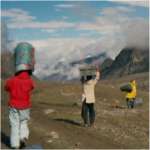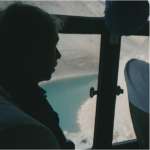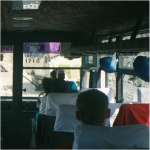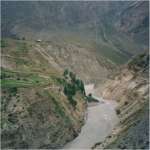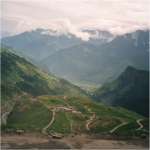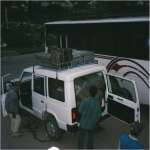 |
Tagne 2001 |
 |
Dan's DiaryDay 38 - Saturday 4th August 2001
I crawled out of my sleeping bag and headed towards the mess tent at what felt like far too early an hour. My laces trailed across the dirt behind my boots as I fought for but couldn't find the energy to bend down and do them up. I wrestled with my coat, trying to put it on to protect me against the morning drizzle and succeeded in doing so just as I arrived at the mess tent. Having struggled to get it on I wasn't going to remove it again, so I sat down and ate what was on offer. Sonam asked how I felt. I told him I was better. In fact what I meant was better than the previous day but still not great. Jon, Andy, Alan and Steve were all tucking in to a pile of pancakes in the center of the table. Sonam kept coming backwards and forwards between our tent and the cook's tent bringing omelette after omelette. He asked us whether we preferred omelettes or pancakes and before long more pancakes were sent our way. There were no roti that morning, but who could blame the cook - he had been making them every day for the past four weeks. Our "use-up-all-the-left-over-eggs breakfast" was a nice change anyway. We all congregated outside and Steve organised the taking of several group photos of the team and staff. Forms were handed around after breakfast as Zingaro Travels wanted to know our names and addresses along with what we thought of the cook, sirdar and porters throughout the expedition. Tips were arranged for Sonam, the cook and the porter while I packed all the left over mountain food and toilet rolls into one of the kit bags. The coach arrived and parked on a side track next to the derelict army barracks. With the rain dying away, I threw everything in my rucksack and went to take it up to the bus. Deui saw me and insisted that he took it, so I followed on behind with Alan who helped me carry one of the heavy kit bags up to the bus. We returned to the campsite and took down the damp tents. I watched an endless convoy of army trucks heading up over the pass, almost shunting each other up the slope. One truck got stuck on a steep bit and had to roll backwards to get a sufficient run-up to make it to the top. With everyone else busy ferrying the bags up to the coach Andy and I helped out by taking a trunk up. We had a look inside the derelict army building, which stood out as a blot on the landscape. The building was built one floor off the ground, probably so that the occupants could still get out after heavy snowfalls in the winter. The internal ceiling had collapsed, which I thought was a bit strange as the exterior roof was in mint condition. I went back to the campsite for the last time, picking up the remaining bags and looking around to ensure nothing was left. It was then back up to the coach, where the last of our bags were being packed. The cloud had started to part and the sun was trying to show itself once more. We all got into the coach and found vacant seats. The coach driver turned on some music, which produced a cheer from our base camp staff. It's always good to hear something after not hearing it for a while, even if it is only Indian music. The engine was started and we pulled away: our journey home had begun. The side track that the bus was parked on was very bumpy and riddled with potholes. I kept expecting at any moment to reach nice flat smooth tarmac as we rejoined the main road. After what seemed like an eternity of waiting I realised that it was never going to come. We were in fact on the main road and had been for some time, but it was no better than the side tracks.
The descent was bumpy. Scree extended up to the right as far as the eye could see and down to the left many hundreds of metres below to the valley floor. The bus kept lurching from side to side as the wheels navigated their way through as many potholes and over as many rocks as they could find. Despite my deliberately choosing a different seat from the previous time, I still found myself coming closer and closer to a reclining position with every jolt. It made me wonder if it was a built in feature to make you go to sleep, but no one else seemed to be having the same problem. Maybe I was just too heavy. We hadn't been going long before a goods vehicle could be seen coming up the road. We pulled in and waited for it to pass. By the time the vehicle was near, two more trucks had come around the bend a mile or so down the road. We were forced to wait for them to pass as well due to the lack of passing places. Just as they passed us, another two goods lorries came into view. I began to wonder how long we would be there waiting for all these vehicles to pass. My speculation only deepened when the driver switched off his engine, realising there was nothing he could do. We watched the trucks slowly crawling up the road towards us. An oil tanker led the way up a steep section of the road and got up all right, but the goods truck behind it got held up by the tanker, lost its momentum and stalled. It rolled back down the road, with only a couple of feet of loose scree between it and the crystal blue lake several hundred metres below. The truck revved its engine and took a run up but still it only got half way up the slope. A bloke jumped out and started throwing rocks under the tyres. Oh no, not a puncture I thought. We would be there for hours while the wheels were exchanged, not to mention the hold-ups afterwards. Billowing plumes of black smoke came from the lorry as it revved away and I realised the rocks were for extra traction. The truck soon got going again and made it up past us, the driver smiling embarrassingly for having held us up, but didn't bother to slow to talk for fear of never getting going again. With a clear road as far as we could see we continued with our descent. Narinder moved into the front section of the bus either for a fag or to listen to the music. The front section of the bus housed the driver and could seat four or five other people. It was partitioned off with clear Perspex windows and door from the rest of the bus. Narinder opened the door and made a grab for the handrail attached to the ceiling as the bus lurched from side to side. The handrail came off in his hand and he fell, landing on the toolbox. The other end of the handrail had come out of its bracket and hit the driver on the back of the head. Thankfully the driver was all right and kept his eyes on the road. Narinder's face was expressionless as he worked out what to do with the metre long handrail. Our descent took us through many more scree fields and over some bridges made of creaky wooden struts, which flexed under the weight of the vehicle. Each bridge had a ford next to it, presumably from when there had been no bridges in place, and possibly for when the bridges should fail. The road zigzagged across the boulder-strewn valley bottom as we descended yet further. Every bend had a direct route over the scree, obviously for lunatic jeep drivers who wanted to overtake slow lorries on the way down. These short cuts were often at incredibly steep angles. Just from looking at them, I concluded it must have been a madman who created the tracks. My watch told me we were descending at 20 metres per minute. This sounds all the more impressive when you remember the state of the road and the fact this continued for many endless hours.
We passed a group of men mending their bulldozers. Just around the bend a square rock, the size of a Mini, lay in the middle of the road. There was no high ground close by from where it could have rolled or fallen from. I concluded that the bulldozer had been moving it out of the way from the road above and had rolled it onto the road below. The thought amused me. The scree had been cleared and flattened by the side of the road, on either side of the rock so that vehicles could get past. This rock now formed a roundabout in the middle of nowhere - how bizarre. Further along, thick black smoke could be seen pouring into the air from around a distant bend. I expected it to be another goods truck, but on approaching the bend nothing had come into view. Fearing the worst I thought that perhaps a vehicle had got stuck or broken down, but the smoke turned out to be coming from huge roadside vats of molten tar. A whole herd of men dressed in Army outfits were building the road. Each person had his own job, forming a chain. One person was getting rocks from the scree slope, another smashed the rocks with a hammer, while someone else sifted the broken rock. There was a person who stoked the fire while another person put tar in the vat and someone else added stones to the vat of tar. A different person emptied the vat, another person wheeled the tarmac to the road in an old wheelbarrow and someone else would rake it flat. The steamroller driver was snoozing in his cab and I imagined him smiling cheekily as we passed as our coach had just done his job for him. Oh and then their was the guy with the water ready to cool anything or anybody who needed cooling. It all looked like very hard work and yet they were in no rush to stop what they were doing and let us pass. We slowly crawled our way through at least four or five of these production lines working one after another over a hundred-metre stretch. I couldn't help but feel sorry for them: they were putting in all that hard labour, but within a few years their road would become as broken and potholed as the rest of the highway because they weren't laying any foundation. Still I suppose this guarantees them work in the future. The bus continued down the road. For a time it was nice and unnervingly smooth as we drove over the newly tarmacked section but before long it deteriorated and we were soon back to bashing our heads against the window with every jolt of the bus. We crossed the river back on to the other side of the valley and passed a JCB digging a hole near where part of the road had been washed away by the river, presumably for the foundations of the reinforcements they were going build. Further down there were more burning vats of tar as more men were resurfacing another stretch of road. Here women and children also helped in the collection and breaking up of rocks. On other stretches of the road, locals were building retaining walls for the soft, easily eroded mud cliffs beside it, which contained boulders plenty big enough to block the road for good. In some places wallet-sised stones had been carefully placed in rectangular blocks some six inches high and two metres long by the side of the road. These were too perfectly formed to be anything other than finished and yet being so low and having gaps of up to 10 metres between them meant they surely can't have been to prevent landslides blocking the road. I concluded that either the locals had got carried away with building things with rocks (I could relate to this what with my dam and bench) or it was for the drivers to get immense satisfaction from driving through the neat, perfectly formed rectangles, sending stones scattering, just as kids love to knock down sandcastles that someone else has made. Before long the road entered a flattish plain. Grass was trying to grow where the rocks would allow it. A large flat helipad some 100m long and 75m wide was marked out with rocks on the plain with a tiny H in the middle made from white rocks. "The pilots can't be that good if they need all that space to land a helicopter," I thought. The road took us through the centre of an army barracks in the middle of the plain. Some army chaps were queuing for food, some were marching and others were walking around with tables on their heads! Twenty old guys were doing squatting exercises in square formation. A man with more than his fair share of facial hair and a large belly led them with a long stick. A few people wandered around not doing anything and then we came to the two who manned the checkpoint. They were laid back in their deck chairs, taking it easy, with the barrier tied off at an angle of 45o so they neither had to raise nor drop it as vehicles came and went. The road continued to descend, becoming narrow again with a large drop down into the deep gorge on one side and steep, precarious cliffs on the other that stretched upwards for many hundreds of metres, as far as I could see. Boulders the size of minibuses overhung the road, waiting to fall at any moment. In places, rock had been carved out from the hillside to make the road, cutting into the cliff face. Out of the gorge, we soon started passing small stone-walled shacks with brightly coloured tarpaulins for roofs. All the people we saw watched us as we passed. They would stand and stare gazing at us until we disappeared into the haze. For all I know they could still be standing there now, their eyes fixed in the direction where we were last seen. What was it with these people? Many foreigners had been to the region before us. We weren't significantly different to them. Maybe the locals had nothing to do all day but watch the occasional passing bus full of tourists. As we descended yet more, so the landscape became much greener. Grassy meadows lined the bottom of the valleys. There were a few small trees, with kindling tied around their trunks to protect them from the harsh frosts. Flowers were trying to blossom, the water in the streams was crystal clear and everything looked fresh and full of the joys of spring. A few shepherds and horsemen were seen camping on a plain, either returning from or heading out to work. It was 11am by the time we had reached Darcha. Deui asked for our passports as he had to go and show them at the police checkpoint. Andy took longer to find his than the rest of us. He said he knew he had his passport, but couldn't remember where he had put it! Eventually with five passports in his hand Deui wandered across the road towards a small building with policeman standing outside and entered. Andy and Narinder followed Deui so they could make sure the authorities had been informed of the horseman incident. With all the bureaucracy completed we retreated to a dhaba for some tea. There were only three dhabas on the side of the road, but could Andy find the one we were in once he'd finished in the police building? The porter went out to rescue him. A dhaba is a sort of shop, house, restaurant, café, general store and bunkhouse all in one building and the dhaba that we drank tea in, in Darcha was the finest example yet of such a building. We continued on to Keylong for lunch, past more women and children repairing to the road. An army tanker was being filled up with water from a gushing stream, possibly for cooling the hot tar. We passed through many small villages, each abuzz with people doing everyday things. Lines of women washed their clothes at the riverbank.
It was 12:30pm by the time we stopped in Keylong. The bus found space on the side of the road to park. We walked through the small but bustling village centre. People were everywhere. The streets were half blocked by parked vehicles and old tractors towing trailers of people. We were ushered into a Tibetan dhaba, where after our normal indecisiveness we ordered mutton, noodles and veg. Soup, and meat parcels (mutton momo), also came with the meal. Back on the road, we experienced more in the way of tarmac and less in the way of rubble, which was good. The roads were faster and flatter now, although there were still places where the road had disappeared into the river below. We still drove by the side of the same river that started up near the Baralacha La. By now the river was very large, filling the bottom of the V-shaped valley it had carved. The road was etched into the middle of the valley side, with slanting rock walls extending up and down for as much as a thousand metres. Waterfalls, some hugging the rock and others freefalling for hundreds of metres were fed by the melting hanging glaciers partially hidden in the cloud. I opened the window to try and take a photo and almost got blinded by the light, forgetting that the windows were tinted. We passed the massive plain where the river we had been following joined the mighty Chandra river. Both rivers were massive before they joined, but at the confluence the power displayed by the mass of raging waters was awesome. We followed the road up along by the side of the Chandra river. The road ran along, almost within touching distance of the roaring silt-laden waters. At the end of the valley, clouds had started to roll in and sure enough they brought rain with them. As we made our way up the valley so the road left the valley bottom climbing midway up the valley side, away from the danger of the river and towards the danger of rock falls. A brief roadside stop to empty bladders saw us meet Prem Singh and the party he was taking to look for the horseman's body. They had a long journey ahead of them and I didn't envy them. It wasn't until we had almost gone through Gramphu that we realised where we were. We had completed a full circle around the Central Lahaul Massif and were back where we had started. I thought of all the things we had done in that time, and wondered who would have thought back then of all that we had experienced. The bus continued on the never-ending sequence of corners, winding backwards and forwards and ascending for over a thousand vertical metres up to the Rohtang Pass. Towards the top you can look down and see the entire road behind you, tiny vehicles following you many miles back down the road. Up in the clouds, two sheep scampered across the road in front of us. The clouds parted, briefly revealing two shepherds, huddled on a rock with a blanket wrapped around them, watching the rest of their herd. The wind was gusting, it was drizzling and the air was bitterly cold. I thought of what they must go through. Their days must be long and tedious. What do they do with all that time they have? Maybe that's why they wander around. For what other reason would they spend ages going up to the head of the valley where grass is sparse when there are plenty of lush green pastures further down the valleys? Maybe it is because the shepherds set out too early each year, find no grass and so keep ascending up the valley. Then by the time they reach the head of the valley, spring is well on its way and the grass-growing season has begun. They return when the snows drive them down the valley and hence see no evidence of the summer lush green pastures further down the valley. Maybe I should tell them.
The Rohtang Pass was again in cloud and rain was sporadic. There were not many people around: the Indian holiday season had obviously ended. We descended part of the way and stopped at a dhaba for some tea. I smashed my head on the lintel and cursed myself for doing such a stupid thing. Steve drank his tea slowly and although he thought it rude that we suggested getting up and leaving him to drink his tea, we didn't have much choice when the bus driver started the engine and pulled up outside the dhaba. The road took us over a bridge, down through grassy slopes littered with huge house-sized boulders, some of which overhung the road inches from my tinted glass windows. I think our bus driver was on a mission to get to the hotel before darkness fell because we spent most of the descent chasing and overtaking a convoy of lorries. A series of blasts from the horn would precede any overtaking manoeuvre on the narrow road, which zigzagged backwards and forwards down the hill. The driver also got to exercise his horn at some big bulls that just didn't want to move. These animals had miles and miles of lovely fresh pasture and yet all they wanted was to hang about in the middle of the road. How daft is that? Sheep are the same. Honk at a sheep and it would much rather run along the road in front of you than step aside and let you past. The foliage was thick, and much changed from five weeks earlier. Thistles, the size of which I have never seen before, stood up to a couple of metres in height. The road took us through another village, which was probably only there because of the army barracks on the other side of the river. The coach braked suddenly as a motorbike came around a tight corner on our side of the road. Both driver and passenger wore white helmets with the letters MP painted on in black. I deduced this stood for mental patient. Fortunately they just missed the front of our vehicle. Before long we were entering Manali. It was good to recognize things, the bridge, the place where they tip the rubbish into the river, the main square and the restaurants we had eaten at. I hadn't realised how familiar we had become with Manali. It was almost like a second home. We dropped Deui off in the centre and continued down to our hotel.
We arrived back at the Victoria Palace hotel at 6:52pm. The bus was quickly unpacked with everyone lending a hand. Deui arrived in a jeep and loaded it up with all the equipment that belonged to Zingaro Travels. Andy went and got the keys to our rooms. Steve took the first room and opted to share with Alan again, leaving Andy, Jon and me with the second room. This had a hidden adjoining bedroom, which we hid from Alan and Steve so they wouldn't want to swap. We checked that we had all our bags before proceeding down to the front of the hotel to say our goodbyes. The staff were just finishing loading up a jeep with all the cooking equipment and the tents, tying the last of the jerry cans to the roof. We shook hands, saying our thanks and farewells, and handing them their tips. The others decided to head up into Manali for a meal, but my head had never recovered from being smashed into the lintel, so I made do with a packet of biscuits in my hotel room. I couldn't get the TV to work so it was an early snooze for me.
|
© Copyright Steve Jolly 2001. |
